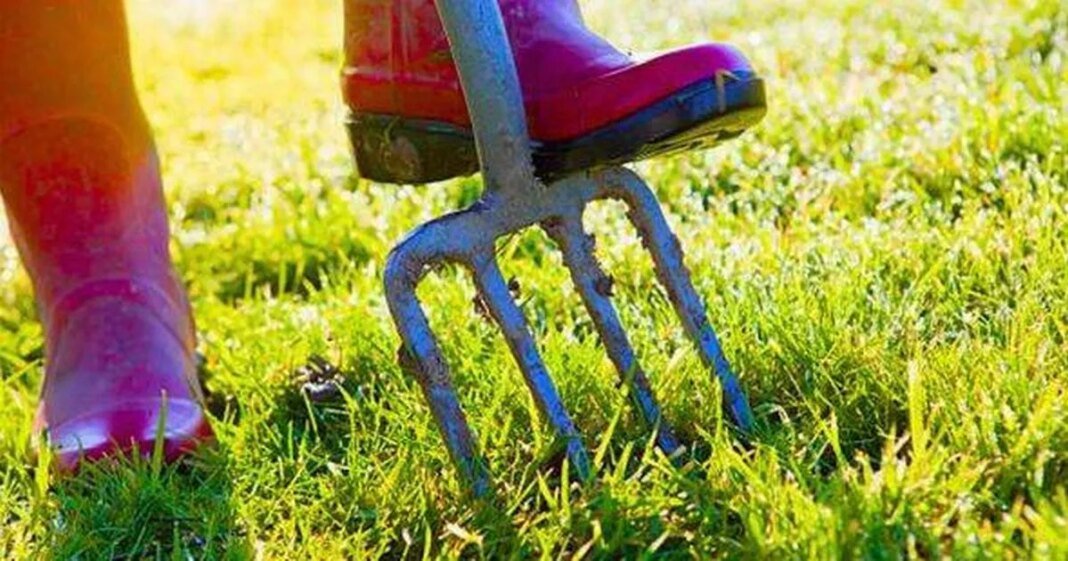Although January may feel like a quiet month for gardening, as winter starts to retreat, there are crucial garden tasks to tackle to set the stage for the warmer months.
While lawns typically enter a dormant phase during this season, preserving their energy in anticipation of the growing season, it’s recommended to avoid mowing or fertilising, which can interrupt their natural rest and make them vulnerable to the chill, potentially leading to weaker grass.
Instead, Jamie Shipley, a gardening expert and MD of Hedges Direct, recommends a trio of lawn care activities to get your greenspace spring-ready. Lawncare chores for January include clearing away leaves, moss, algae, and detritus as maintaining a tidy lawn is key during the cold spell – the extra moisture from frost-laden foliage may become a magnet for bugs, disease and unwanted flora.
Moss and algae thrive under moist conditions and if left unchecked could battle with your turf over precious nutrients and sunlight, causing it to weaken. In Jamie’s words: “The upkeep of your garden in the earlier months will make it easier to maintain throughout the year. Rake and remove leaves and debris to keep things tidy and give your grass and greenery sunlight and fresh air.”
If you’ve noticed some unsightly brown patches on your lawn, chances are it’s moss. To tackle this, grab a rake and give the grass a good scarifying to clear away any rotting vegetation.
Algae can be just as easily dealt with using a household staple – white vinegar, the same kind you douse your chips in, because its acidity hampers algae growth, reports the Express.
Gardening expert Jamie explained: “Built-up moss on lawns can be loosened and removed by scarification with a rake and algae can be cleaned with a 1:1 mixture of vinegar and water.”
He also suggests inviting earthworms to your garden party by adding soil that encourages these wriggly friends to visit your grass. They’ll help aerate compacted soil, allowing more oxygen, sunlight, and water to reach the roots. Hardened soil struggles to soak up essential nutrients, often leading to brittle, yellow grass.
Jamie added: “Earthworms help create and maintain healthy garden soil by eating decaying plant material. The casts are left as a result of this worm activity and while they can be unsightly, they actually cause little harm and can add nutrients to your lawn.
“The casts should be brushed and broken up with a lawn rake in dry weather, before being spread out to incorporate their nutrients back into the lawn.”
And when it comes to lawn care in January, sometimes the best action is inaction. By simply avoiding walking on frosty grass, you prevent damage during its most vulnerable state.
Jamie advised: “If your grass is frosty or under a layer of snow, avoid stepping on it. This can burn or scorch the grass and leave black or brown footsteps.”
He added: “Make sure to keep an eye on your grass though as it is easy for water to build up in wintertime, which can not only attract moss, disease and pests but can rots the roots to severely damage the lawn.
“After periods of heavy rain, waterlogged lawns may need to be aerated. Use a garden fork or mechanical aerator to spike your grass and fill the holes with a blend of sharp sand and loam.
“Aeration is the simple process of poking holes in your lawn using a pitchfork to encourage more air circulation and is one of the best ways to help your grass stay healthy so it is thick and lush come spring.”
At Reach and across our entities we and our partners use information collected through cookies and other identifiers from your device to improve experience on our site, analyse how it is used and to show personalised advertising. You can opt out of the saleor sharing of your data, at any time clicking the "Do Not Sell or Share my Data" button at the bottom of the webpage. Please note that your preferences are browser specific. Use of our website and any of our services represents your acceptance of the use of cookies and consent to the practices described in our Privacy Notice and Privacy Notice.

